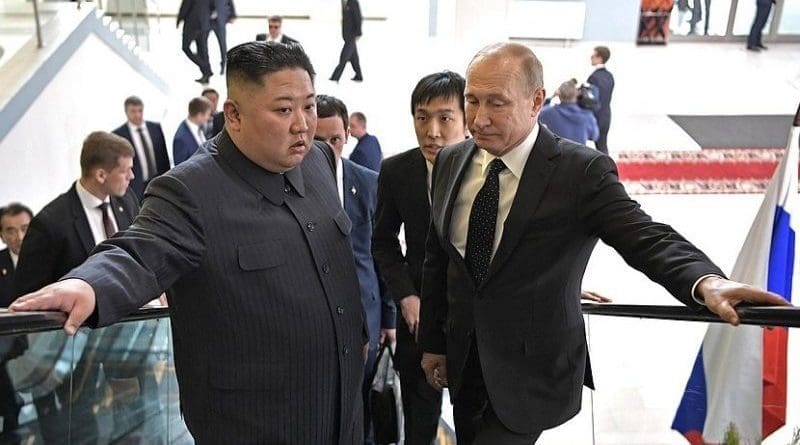Putin’s Visit To North Korea: Geopolitical Shifts And Global Implications – OpEd
President Vladimir Putin’s visit to North Korea comes at a crucial time for global relations and signifies a significant shift in geopolitical dynamics. This visit not only highlights the strengthening of Russia-North Korea relations but also has profound implications for the Korean Peninsula and the international community as a whole. This essay explores the multifaceted consequences of this diplomatic engagement, examining its impact on regional stability, geopolitical alliances, and the global response to North Korea’s contentious activities.
Strengthening Russia-North Korea Relations
Putin’s visit to North Korea signifies the strengthening of diplomatic and economic ties between Moscow and Pyongyang. Throughout history, Russia has maintained a cautious yet supportive relationship with North Korea, driven mainly by strategic and economic interests. This visit reaffirms that relationship and has the potential to enhance bilateral cooperation in various sectors, such as trade, energy, and military technology. By forming such an alliance, North Korea would gain a crucial economic lifeline in the face of strict international sanctions, enabling them to alleviate some of the economic pressures imposed by the United Nations and Western powers.
Geopolitical Dynamics and Regional Reactions
The visit has implications beyond the bilateral relationship and has the potential to impact the broader geopolitical landscape of East Asia. For South Korea and Japan, who are traditional allies of the United States, the strengthening ties between Russia and North Korea raise significant security concerns. These nations may see the visit as a direct challenge to their security interests, leading them to reevaluate their defence strategies and diplomatic approaches. Additionally, the United States, which has long sought to isolate North Korea through sanctions and diplomatic pressure, sees this development as undermining its efforts. As a result, the U.S. could increase its military presence in the region or enhance diplomatic engagements with South Korea and Japan to counterbalance Russian influence
Impact on Sanctions and International Response
One of the immediate implications of Putin’s visit is the potential to weaken the international sanctions regime against North Korea. By establishing robust trade and financial channels with Russia, North Korea could alleviate some of the economic pressures that have crippled its economy. However, this would likely provoke a strong response from Western countries, potentially leading to new rounds of sanctions or diplomatic measures against both Russia and North Korea. The European Union and other global powers may also join these efforts, seeking to uphold the integrity of the international sanctions framework and prevent erosion of its effectiveness, particularly in influencing the North Korean nuclear program.
The visit could have significant implications for North Korea’s nuclear ambitions. If cooperation with Russia is enhanced, it may provide Pyongyang with critical resources, technology, and expertise to advance its nuclear and missile programs. This scenario would worsen security concerns not only for neighbouring countries but also for the international community as a whole. The possibility of North Korea accelerating weapons development could lead to a regional arms race, with South Korea and Japan potentially bolstering their military capabilities in response. Moreover, this could hinder denuclearization efforts and complicate negotiations, making it even more challenging to achieve a peaceful resolution to the North Korean nuclear issue.
Regional Stability and Military Tensions
Putin’s visit to North Korea may increase tensions on the Korean Peninsula, raising the risk of military conflicts. The fact that a major power like Russia supports North Korea might make Pyongyang more confident and inclined to adopt a more aggressive approach towards South Korea and other regional players. This enhanced assertiveness could result in more frequent missile tests, military drills, or even border skirmishes, further destabilizing the region. Furthermore, the visit could impact peace negotiations by potentially hardening North Korea’s negotiating stance, making it more challenging to achieve meaningful progress in diplomatic talks aimed at reducing tensions.
Broader International Implications
On a global scale, the visit reflects Russia’s broader strategic objective of asserting influence and challenging US dominance in international affairs. By aligning closely with North Korea, Russia aims to expand its geopolitical reach and create a counterbalance to Western hegemony. This strategy might inspire other countries under international sanctions, such as Iran or Venezuela, to seek similar alliances, thereby complicating global diplomatic and economic relations. Furthermore, the visit highlights the shifting dynamics of international alliances, where traditional power blocs are increasingly being questioned and redefined in response to evolving geopolitical realities.
Conclusion
The visit of Russian President Vladimir Putin to North Korea has important implications for the Korean Peninsula and the international community. The growing relationship between Russia and North Korea could potentially destabilize the security environment in the region, undermine international sanctions, and expedite North Korea’s nuclear program. Additionally, this visit reflects Russia’s larger strategy of challenging Western dominance and reshaping global alliances. Therefore, it is crucial for the international community to closely monitor these developments and responses to maintain stability and ensure the effectiveness of the global sanctions regime. This visit serves as a clear reminder of the complexities and interconnectedness of contemporary international relations and actions, where the actions of one state can have far-reaching consequences for global peace and security.
The opinions expressed in this article are the author’s own.
.References
- Chestnut Greitens, S. (2019). “North Korea’s Strategies to Adapt and Deter: Building a Domestic Knowledge Base for Counter-Sanctions.” Asia Policy, 14(2), 39-64.
- Haggard, S., & Noland, M. (2017). “Hard Target: Sanctions, Inducements, and the Case of North Korea.” Stanford University Press.
- Kim, D. (2020). “The Impact of U.S. Policy on the Security Environment of Northeast Asia.” Journal of East Asian Affairs, 34(1), 123-145.
- Revere, E. J. R. (2019). “The U.S. and North Korea: No “Art of the Deal”.” Brookings Institution Report.
- Rumer, E. (2019). “Russia in the Middle East: Jack of All Trades, Master of None.” Carnegie Endowment for International Peace.

